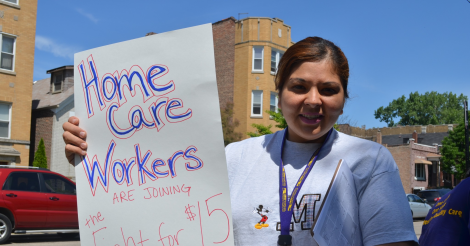

In the United States, over 2 million home care workers are paying the price for the greed of the few.
Home care workers help people with “disabilities, chronic illnesses, or cognitive impairment by assisting their daily living activities,” as noted by the Bureau of Labor Statistics. This field includes personal care aides, home health aides, nursing assistants and direct support professionals.
The Centers for Disease Control and Prevention found 4.9 million adult patients received some form of home health care in 2013. As the senior population increases, so will the demands for home care services. Current projections indicate that home care work is the fastest growing occupation, with 1 million jobs to be added by 2026.
While one cannot put a price tag on a human life and the quality of that life, the home care health industry does so under the banner of capitalism. Home care health is dominated by for-profit agencies. CDC data from 2014 indicates that of the 12,400 home care agencies operating in the U.S., 80 percent of them were for-profit organizations, with the other 20 percent nonprofit or government owned.
As with other health care entities — pharmaceutical companies raise costs for lifesaving medicines and health insurance companies raise premiums — these for-profit agencies will continue overcharging clients and underpaying home care workers.
Hourly wages for home care workers have “barely risen” over the past decade, according to the Paraprofessional Healthcare Institute study “Home Care Workers: Key Facts.” (phinational.org, August 2018) Adjusted for inflation, the median hourly wage for home care workers was $11.03 in 2017 compared to $10.66 in 2007.
In many cases, workers have to shoulder the burden of on-the-job costs without compensation. For example, many agencies do not provide company vehicles for direct support professionals, forcing them to drive their own cars, pay for their own gas and pay for repairs.
From there, it only gets worse. Home care workers have lower job stability, shorter working hours and are less likely to have fringe benefits than those working in hospitals and nursing homes. As a result, over 20 percent of home care workers live in poverty.
Besides the financial toll, these jobs also take a physical and mental toll on these workers.
In 2017, a study from the American Journal of Public Health concluded: “Worker’s jobs affect their health-related quality of life.” AJPH ranked home care aides (along with nursing and psychiatric aides) among the occupations “reporting the most cases of workplace injuries and illnesses.” (tinyurl.com/ybshkssn)
One BMC Nursing review found that home care workers were at “higher risk of injury than registered nurses and licensed practical nurses.” (tinyurl.com/y8n599w5)
The stress of the job combined with financial insecurity are responsible for the high turnover rate in this field. BMC Nursing even fears there might be a shortage of home care aides in the future.
Home care health services are a necessity, as are the workers providing them. But with mass privatization and cuts to nonprofit and government-owned agencies, these services are treated as a luxury and the workers are treated as expendable.
Home care workers, along with the people they help, will continue to suffer financially, mentally and physically under the current system. Only revolutionary change will provide such services to those who need them and fairly compensate those who provide them.
In the 1950s, when Japan and much of Europe was in ruins, the U.S. accounted…
This “Call from the General Federation of Trade Unions in Gaza to Labor Unions in…
Desde que la administración de Donald Trump/Elon Musk tomó las riendas del poder a finales…
Philadelphia Palestine activists marched from Philadelphia City Hall to Day & Zimmermann on April 18…
Marching up Blue Hill Avenue. through the Black and immigrant Dorchester neighborhood, Trans Day of…
This statement was recently issued by over 30 groups. On Friday, March 28, Dr. Helyeh…